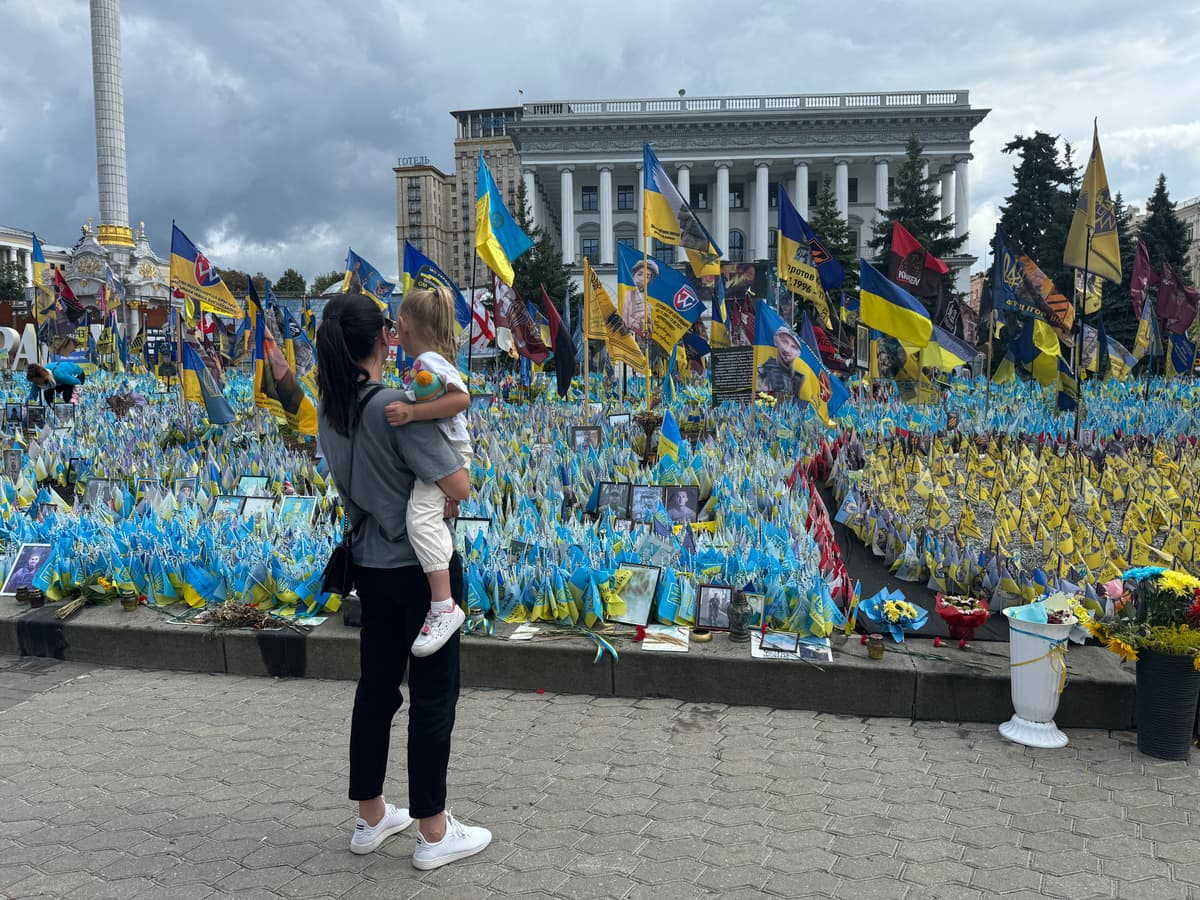Heartbroken Ukranians More Open To Ceding Territory for Sake of Peace
‘Young people are dying. Human life is the most precious thing,’ a school teacher tells the Sun.

KYIV— Serhii Kovalenko recently buried two of his young students who were killed in a battle. He now smiles as he watches his 5-year-old daughter play in the sandbox in the park — something he can do on a Thursday morning as his school is in summer recess. In the back of his mind, he is thinking about another student who is fighting for his life in the hospital after being injured on the frontline.
The 59-year-old secondary school teacher grew up under the Soviet Union and witnessed his country gain independence in 1991. He wants Ukraine to recover all the territories it has lost since 2014 — when Russia occupied Crimea and Donbas. Yet he says that Ukraine should prioritize people, not the territories.
“I prioritize human life. I put human life in the center,” Mr. Kovalenko tells the Sun. “Young people are dying. Human life is the most precious thing.”
Polls show Ukrainian civilians are becoming more open to peace talks with Moscow. Russia is making incremental gains in Ukrainian territory, Kyiv’s counteroffensive is failing, and daily power blackouts continue. Even though a majority still oppose ceding territory to achieve peace, the number of those willing to give up regions to end the war is slowly growing.
About 44 percent of people in Ukraine think peace talks between Kyiv and Moscow should begin, according to a poll conducted by Ukrainian newspaper ZN.UA. Another survey released by the Kyiv International Institute of Sociology says that 32 percent of Ukrainians are ready to make territorial concessions to Russia — more than three times the number of people who agreed in May 2023.
The Kremlin said last week that it is open to negotiations with Ukrainian President Zelensky. “From a practical point of view, we’re open to achieving our goals through negotiations,” Kremlin spokesman Dmitry Peskov said.
Last month, Russian President Putin demanded Ukraine cede the territories of Donetsk, Luhansk, Kherson, and Zaporizhzhia and that they be declared Russian territory under international law.
“I am ready to cede the regions of Luhansk and Donetsk if that could help bring peace,” Kyiv resident Pavlo Denysiuk, 42, tells the Sun. Yet, he fears it will be difficult to negotiate with Russia as history has shown “they can’t be trusted and they only understand the language of force.”
Serhii Dirko, 28, from the northern Ukrainian city of Chernihiv, says if negotiations occur with Russia, the war would end, but could potentially restart later. For his government to return to talks, he expects Moscow to agree to pay for the losses and the rebuilding of the country, and to some security guarantees.
A woman from the Russian-occupied east Ukrainian territory of Luhansk tears up as she begins to speak about her home. She has been living under Russian occupation for 10 years now. She dreams of the day Luhansk will become part of Ukraine again.
“Luhansk is the territory of Ukraine,” she tells the Sun. “Ukraine is my motherland.”
The 44-year-old woman traveled to Kyiv to renew her Ukranian documents — a process that can take up to 60 days for people living in occupied territories. She claims she is not able to leave Luhansk permanently as she doesn’t have the funds. Back in Donbas, she is responsible for her mother and 16-year-old son.
The primary school teacher says that pupils at her school still draw Ukrainian flags. “It is not true that everyone in Luhansk is in favor of Russia. No one wanted to join Russia,” she says.
There are people on the occupied territories still waiting for liberation, an assistant professor of Ukrainian history at Kharkiv National University, Denys Zhuravlev, tells the Sun. “To surrender their land forever is to betray them,” he adds.
To begin negotiations, Mr. Zhuravlev says he would like his government to demand a full withdrawal of Russian troops, an exchange of prisoners, and the liberation of the population from the occupied territories. “But even this requires coordinated, united actions by the Ukranian leadership and all our allies,” Mr. Zhuravlev says.
Lviv resident Olena Svir, whose husband is serving in the army, fears that were Ukraine to cede territory, Russia would return for more. “They will not stop,” she says. “It is like negotiating with the maniac who came to your house to kill you.”
Earlier this month Mr. Zelensky said Russia should be represented in the upcoming peace conference, expected to start in Ukraine before the end of the year. Kyiv and its Western allies have been calling for Moscow troops to leave Ukrainian territory and return to the 1991 borders.
Negotiations will start sooner or later anyway, Odesa resident Serhiy Hulvas, 50, tells the Sun. Yet, he believes that concessions to Russia will open new paths to more violent escalations and that the Kremlin will not seek to conduct constructive and honest negotiations.
“We must remember that it is Ukraine that is the victim of aggression,” Mr. Hulvas says. He adds that Ukrainian politicians and their allies must know that “if you do not protect Ukraine’s interests today, no one will protect your country and your people tomorrow.”
Ukrainians are also closely monitoring elections in America — Kyiv’s largest donor— which could bring a shift in aid. President Trump and his vice presidential nominee, Senator Vance, have been critical of the amount of money Washington has been giving Ukraine. Trump has also said he would end the war in 24 hours if reelected.
Ms. Svir says she prefers to see Vice President Harris win the American election in November. “It disturbs me to think that Trump is going to take some risks in foreign policy that will affect Ukraine,” she says. Yet, Ukraine also remembers that Trump approved a sale of Javelin missiles to the country in 2018, which President Obama had refused to do, she adds.
“Trump is really the only one who is taking action,” Kyiv resident Yuri Dakhnovskyi, 54, tells the Sun. He adds that Trump would be the only person who could bring both sides on the table to negotiate.
Mr. Kovalenko says Ukranians watch for what will happen in America, as they are concerned about Washington reducing aid to Ukraine. “Without it, we can’t fight,” he says. Yet, he remains confident that were peace talks real, “it would end the bloodshed in my country.”

